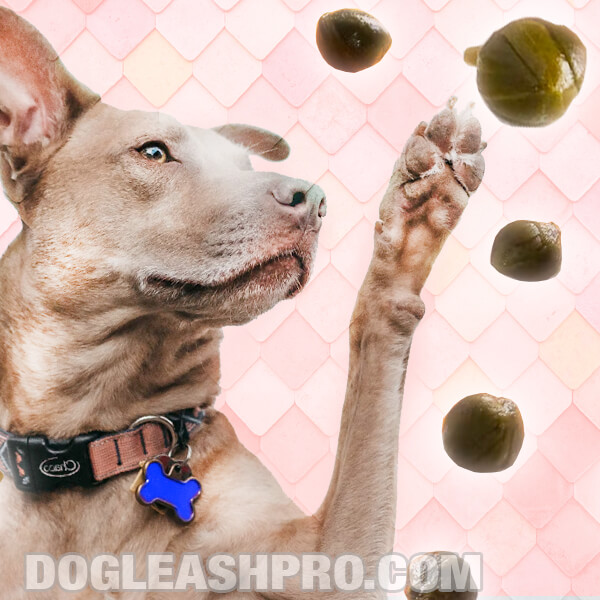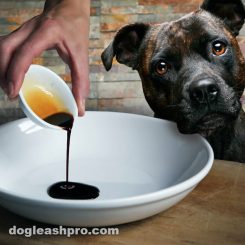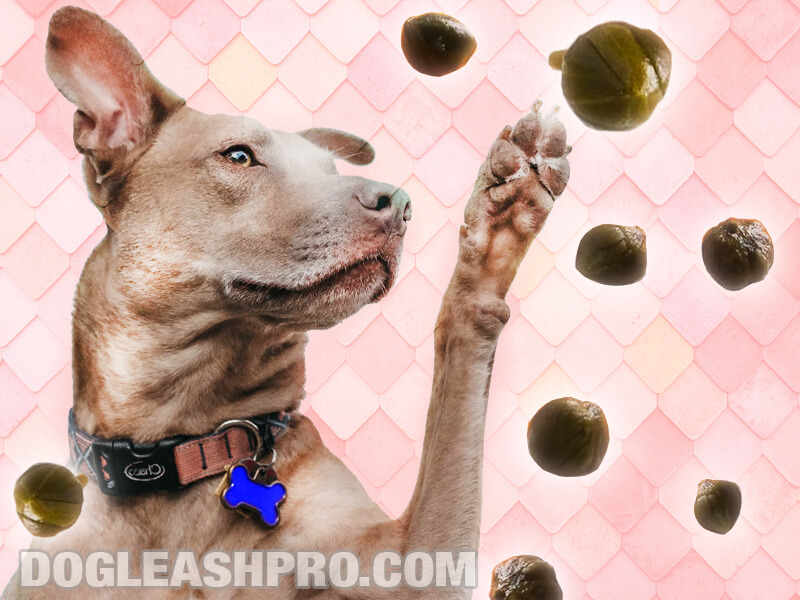
Last Friday, I made an Egg Salad dish for my family and tried adding Capers to spice it up. Being so clumsy, I dropped some Capers onto the kitchen floor. Before I could even clean it up, my dog had already licked them up and eaten them. I was worried and wondered whether Capers are safe for doggy consumption. Here’s the short answer first.
Can dogs eat Capers? Yes, dogs can eat Capers in small quantities since they are not toxic and are packed full of essential vitamins and minerals that are beneficial to your dog’s health. However, if you plan on feeding your dogs pickled Capers, make sure to only offer 2 to 3 Capers as any more can put your pooch at risk of salt poisoning, dehydration, and sudden drop in blood sugar.
In this article, we’ll discuss how you can properly prepare Capers so that they are safe for doggy consumption. We’ll also go over the pros and cons of Capers for dogs and you do not want to miss this! Let’s begin.
Table of Contents
What are Capers?
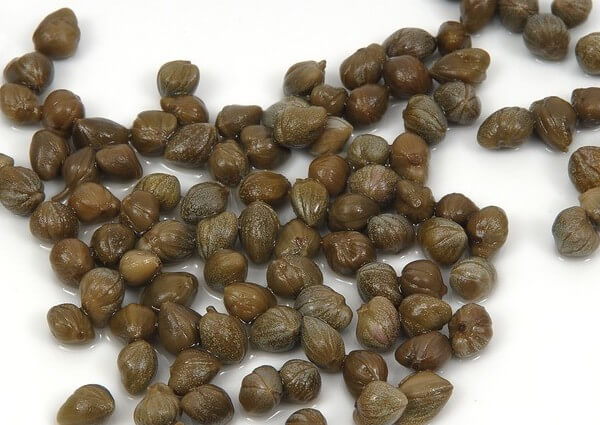
Capers are immature flower buds from the Capparis Spinosa plant or Caper bush. They are tiny, green, oval-shaped flower buds that give your pasta dish or salads that kick of unique flavor.
Before the flower buds have a chance to blossom, they are picked. After harvesting the immature flower buds, they are either brined or dried. This means the buds are soaked, stored, and preserved in brine, which is a solution of water and a high concentration of salt. Lots of salt!
In addition to water and a high amount of salt, sometimes Capers can be brined in distilled vinegar or other forms of vinegar as well.
With that, we can see that Capers can be bad for dogs since anything soaked and preserved in brine can be potentially dangerous for our four-legged friends.
Fun Fact: Beef Brisket is sometimes cured in brine as well. However, there are other aspects of this meat that you should be aware of if you plan on feeding it to your precious pooch. Check out Can Dogs Eat Brisket? to find out what they are before sharing this meat with your pup.
Let’s take a look at the nutritional profile of canned Capers since these are what we usually find at the nearest grocery stores or supermarket.
Nutritional Profile of canned Capers (1 tbsp, drained (8.6g))
| Name, Unit | Amount |
| Calories, cal | 1.98 |
| Sodium, mg | 202 |
| Carbohydrate, g | 0.421 |
| Sugars, g | 0.035 |
| Total Fat, g | 0.074 |
| Protein, g | 0.203 |
| Fiber, g | 0.275 |
| Calcium, mg | 3.44 |
| Iron, mg | 0.144 |
| Magnesium, mg | 2.84 |
| Phosphorus, mg | 0.86 |
| Potassium, mg | 3.44 |
| Zinc, mg | 0.028 |
| Copper, mg | 0.032 |
| Manganese, mg | 0.007 |
| Selenium, µg | 0.103 |
| Vitamin C, mg | 0.37 |
| Thiamin, mg | 0.002 |
| Riboflavin, mg | 0.012 |
| Niacin, mg | 0.056 |
| Vitamin B-6, mg | 0.002 |
| Folate, µg | 1.98 |
| Carotene, µg | 7.14 |
| Vitamin A, µg | 0.602 |
| Vitamin E, mg | 0.076 |
| Vitamin K, µg | 2.12 |
Are Capers bad for dogs?
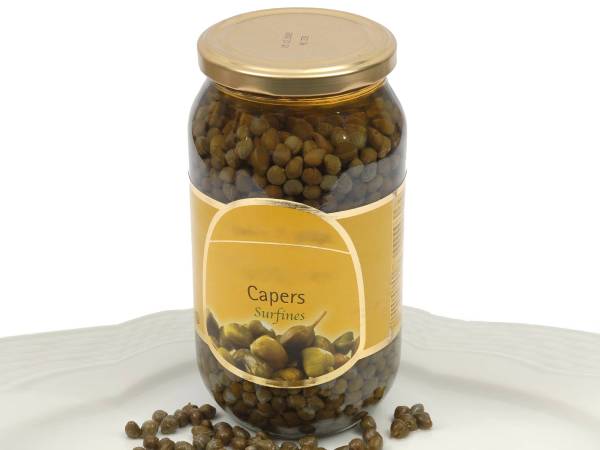
Yes, Capers can be bad for dogs if your furry friends consume too many pickled Capers.
Here’s why.
High salt content from pickled Capers can lead to salt poisoning in dogs
As we can see from the nutritional profile of canned Capers, there is 202 mg of sodium in just 1 tablespoon of drained Capers or 8.6g of Capers. While it may not seem like a lot of salt for us, this is considered a lot of salt for our furry family members.
Keep in mind that dogs should only have about 0.25 grams to 1.5 grams of salt per 100 grams of food and their regular doggy meal should already contain enough sodium for them for that day.
If we convert 202 mg of sodium to grams, that would be 0.202 grams of salt! This is in addition to the amount of salt they’ve already consumed from their main meal.
So if your pooch continues to consume salty food like Capers that are packed full of sodium, they can exceed their salt intake amount. This can lead to sodium poisoning in dogs.
You may be interested in: Can Dogs Eat Cottage Cheese?
Signs and symptoms of salt poisoning in dogs include:
- Brain cell destruction. Dogs will experience headaches, dizziness, and even seizures.
- Hypernatremia. When there’s too much salt in your dog’s blood, it can cause his muscle to lose moisture. As a result, your dog will have muscle spasms and will jerk and shake violently.
- Dehydration or extreme thirst.
- Frequent urination.
- Swollen tongue.
- Upset stomach or stomach pain.
- Watery or bloody diarrhea.
- Loss of appetite.
- Nausea which causes vomiting.
- Convulsions.
- Fainting.
- Tachycardia or fast heart rate.
- Difficulty breathing or respiratory distress.
- Confusion.
- Fluid buildup.
- Fever.
- Lack of energy.
- Walking around like he’s intoxicated.
- Coma (in severe cases).
If you suspect your pooch has sodium poisoning, we highly recommend that you contact your dog’s vet right away. Salt toxicity requires immediate medical attention and the sooner this is diagnosed and treated, the better.
Even if your dogs aren’t experiencing any of the above symptoms, you’ll want to consult your vet if you know they just consumed food that contains tons of sodium. Sometimes the symptoms may not kick in right away and may take up to a few hours.
Regardless, contacting your vet or the Pet Poison Helpline is the best course of action. Your veterinarian may ask you to bring your dog in for a physical check-up. Once there, your vet may perform a thorough physical examination of your pooch. It’s a good idea to let your vet know how many Capers your pooch ate and what time he ate the Capers.
Your dog’s vet may also perform the following tests to find out your fur babies’ sodium level:
- Urinalysis.
- Complete blood count.
- Blood gases.
- Blood chemistry.
- Cardiac examination: X-ray, MRI, electrocardiogram (EKG), CT scan, ultrasound.
Once it is confirmed that your furry friend has salt toxicity, the vet may start administering IV fluid therapy and oxygen. Vets may also provide electrolytes to treat dehydration.
Your pooch may have to stay at the veterinary hospital overnight since treating salt poisoning will take time. The high salt level in your dog’s body will need to come down gradually because a sudden drop in salt level can cause brain swelling (cerebral edema) or a heart attack.
Depending on how high your pup’s sodium level were, it may take days to bring down the sodium level to an appropriate range.
With that said, it’s always a good idea to provide your pooch with a bowl of freshwater. Dogs tend to drink some water after their meal, whether or not the meal was salty or not.
Are Capers good for dogs?
Yes, Capers can be good for dogs when consumed in small quantities and if you properly prepare them before feeding them to your fur babies.
As mentioned above, Capers are packed full of essential vitamins and minerals that are beneficial to your canine friends’ health. Let’s go over these vitamins and minerals in more detail and see how they can help improve your dog’s overall health.
Vitamin C in Capers is a powerful antioxidant that can slow down cellular aging in dogs
Capers are chock full of powerful antioxidants and one of them is vitamin C. Also known as L-ascorbic acid, this water-soluble nutrient helps fight against harmful free radicals in the body and aid in slowing down cellular aging in dogs as well as reducing cognitive aging and inflammation.
The antioxidant properties in vitamin C also aid in maintaining a strong immune system in dogs. That’s because once the vitamin C has been absorbed into your pup’s body, it starts to increase antibodies and this gives the immune system an extra boost so that it can combat bad bacteria, viruses, and toxins. This helps to avoid cancerous growth and viral infections in dogs.
Did you know that vitamin C is also a great remedy for dogs with allergies? With sufficient vitamin C intake, this mineral can act as an antihistamine and help to reduce allergic reactions in dogs such as inflammation. Not only that, vitamin C can prevent any future allergic reactions.
What’s more, vitamin C can help improve your K9 friend’s joint and bone health by stimulating the production of collagen. Our four-legged friends need a sufficient amount of collagen because it can help reduce their chances of developing threatening health issues such as hip dysplasia, degenerative joint disease, and spinal issues.
Fortunately, our canine friends are able to produce vitamin C on their own via their livers. However, if they are feeling stressed, sick, depressed, or anxious, their bodies won’t be able to produce as much vitamin C as they need.
And that’s when our furry friends rely on us to feed them food that’s rich in vitamin C such as Capers or give them vitamin C supplements. With the right amount of vitamin C, their coat will also glow and look healthy.
Vitamin E in Capers helps with fat metabolism and cell function in dogs
Vitamin E is another powerful antioxidant that all dogs need. Vitamin E is a fat-soluble antioxidant so it is metabolized like fat and stored in your dog’s liver and fatty tissue. Vitamin E is necessary for optimal health in dogs.
That’s because this essential antioxidant helps to promote a strong immune system in dogs and keeps your furry friend’s heart, muscles, nerve cells, liver, and skin healthy.
In fact, dogs with skin issues like canine atopic dermatitis (CAD) can benefit from vitamin E.
Not only that, vitamin E can help with membrane stabilization in dogs in which the cell membranes are stabilized and this can help dogs manage their pain better.
Similar to vitamin C, vitamin E also helps fight against harmful free radicals and possesses anti-inflammatory benefits. In fact, dogs suffering from canine osteoarthritis may benefit from sufficient vitamin E intake since it can help reduce pain and inflammation.
Dogs with vitamin E deficiencies may experience eye problems, reproductive system issues, and have nervous system problems.
So go ahead and give your pooch two or three Capers for that extra boost of vitamin E.
Fun Fact: Turnips are packed full of vitamin E, but are they safe for canine consumption? Check out Can Dogs Eat Turnips? to find out!
How to properly prepare canned Capers for your dogs
Most Capers you’ll find at your local grocery store or supermarket comes in a small glass jar or can. That’s because these Capers are pickled in brine, which is a solution of a high concentration of salt and water. In fact, some Capers are pickled in distilled vinegar too.
So if you plan on sharing some Capers with your furry friends, make sure to only share 2 or 3 Capers.
Otherwise, here’s what you can do to remove the salty and vinegary flavor and taste from the pickled Capers in 2 easy steps:
- Soak the pickled Capers in a bowl of water for at least two to three hours.
- After, rinse the Capers thoroughly.
The steps above will help to remove most of the salt and vinegar from the Capers so that you can safely share them with your precious pooch.
So, can dogs eat Capers?
As we can see, dogs can have Capers but in small quantities, preferably two or three Capers at most. Our furry friend’s health is our number one priority so we must be careful with what we feed them.
While dogs can enjoy a small amount of Capers, make sure you properly prepare them before giving them to your pooch. You’ll want to thoroughly soak the Capers in freshwater for at least a few hours and then thoroughly rinse them. This will help get rid of most of the salt (and vinegar) from the Capers and make them safe for doggy consumption.
When the Capers are free from salt and vinegar, they are great for dogs as a treat or snack since they contain essential vitamins and minerals that are beneficial to your dog’s overall health.
DISCLAIMER: THIS WEBSITE DOES NOT PROVIDE MEDICAL ADVICE
The information, including but not limited to, text, graphics, images and other material contained on this website are for informational purposes only. No material on this site is intended to be a substitute for professional veterinary advice, diagnosis, or treatment. Always seek the advice of your veterinarian or other qualified health care provider with any questions you may have regarding dietary needs.
Resources:
https://en.wikipedia.org/wiki/Caper

With over five years of specialized experience as an animal writer, my expertise lies in dog nutrition, health, behavior, grooming, and training. I am dedicated to delivering helpful and informative content that caters to the well-being of our furry friends. My primary goal is to empower pet owners with knowledge and ensure our canine companions thrive in health and happiness. In my free time, I love volunteering at local dog rescue centers.
